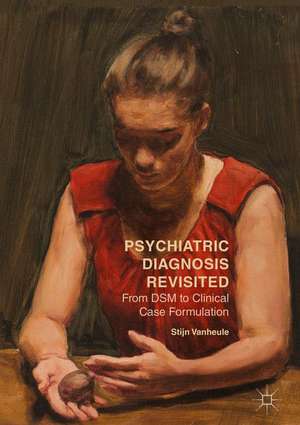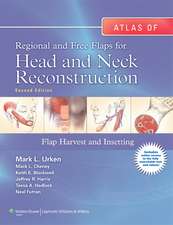Psychiatric Diagnosis Revisited: From DSM to Clinical Case Formulation
Autor Stijn Vanheuleen Limba Engleză Hardback – 6 mar 2017
| Toate formatele și edițiile | Preț | Express |
|---|---|---|
| Paperback (1) | 648.43 lei 6-8 săpt. | |
| Springer International Publishing – 18 iul 2018 | 648.43 lei 6-8 săpt. | |
| Hardback (1) | 780.64 lei 6-8 săpt. | |
| Springer International Publishing – 6 mar 2017 | 780.64 lei 6-8 săpt. |
Preț: 780.64 lei
Preț vechi: 821.73 lei
-5% Nou
149.38€ • 157.08$ • 123.43£
Carte tipărită la comandă
Livrare economică 16-30 aprilie
Specificații
ISBN-10: 3319446681
Pagini: 243
Ilustrații: XVI, 243 p. 2 illus.
Dimensiuni: 148 x 210 x 20 mm
Greutate: 0.46 kg
Ediția:1st ed. 2017
Editura: Springer International Publishing
Colecția Palgrave Macmillan
Locul publicării:Cham, Switzerland
Cuprins
Introduction.- Chapter 1. Dynamics of Decision Making: The Issue of Reliability in Diagnosis.- Chapter 2. Symptom and Context: The Issue of Validity in Diagnosis.- Chapter 3. From Mental Suffering to Mental Disorder and Back Again.- Chapter 4. Working with Clinical Case Formulation: Methodological Considerations.
Recenzii
“The latest publication … provides an alternative diagnostic approach for clinicians working in the ‘psy-disciplines’ via clinical case formulation. … a thought provoking book relevant to a broad range of theorists, academic and clinicians interested in both the scientific / epistemological status of DSM and to clinical practice. … Vanheule’s book makes the case for an evidence based practice where more time – for both direct clinical contact and case formulation practice – is a necessary condition for best clinical practice.” (Alessandro Musetti, Frontiers in Psychology, journal.frontiersin.org, June, 2017)
Notă biografică
Stijn Vanheule is a clinical psychologist and a professor at Ghent University, Belgium. He is also a privately practicing psychoanalyst and a member of the New Lacanian School for Psychoanalysis. He is the author of The Subject of Psychosis: A Lacanian Perspective and Diagnosis and the DSM – A Critical Review.
Textul de pe ultima copertă
This book explores the purpose of clinical psychological and psychiatric diagnosis, and provides a persuasive case for moving away from the traditional practice of psychiatric classification. It discusses the validity and reliability of classification-based approaches to clinical diagnosis, and frames them in their broader historical and societal context. The Diagnostic and Statistical Manual of Mental Disorders (DSM) is used across the world in research and a range of mental health settings; here, Stijn Vanheule argues that the diagnostic reliability of the DSM is overrated, built on a limited biomedical approach to mental disorders that neglects context, and ultimately breeds stigma. The book subsequently makes a passionate plea for a more detailed approach to the study of mental suffering by means of case formulation. Starting from literature on qualitative research the author makes clear how to guarantee the quality of clinical case formulations.
Caracteristici
Explores the historical, philosophical and societal consequences of psychiatric diagnosis
Descriere
This book explores the purpose of clinical psychological and psychiatric diagnosis, and provides a persuasive case for moving away from the traditional practice of psychiatric classification. It discusses the validity and reliability of classification-based approaches to clinical diagnosis, and frames them in their broader historical and societal context. The Diagnostic and Statistical Manual of Mental Disorders (DSM) is used across the world in research and a range of mental health settings; here, Stijn Vanheule argues that the diagnostic reliability of the DSM is overrated, built on a limited biomedical approach to mental disorders that neglects context, and ultimately breeds stigma. The book subsequently makes a passionate plea for a more detailed approach to the study of mental suffering by means of case formulation. Starting from literature on qualitative research the author makes clear how to guarantee the quality of clinical case formulations.









